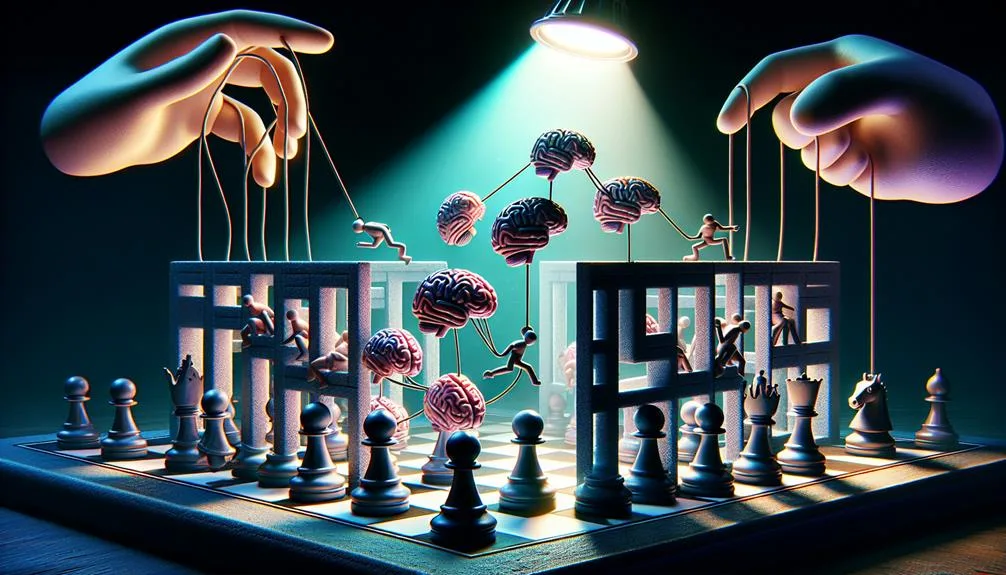Imagine you're walking through a maze; each turn represents the choices you make in your relationships. Sometimes, you might find yourself at a dead end, not because you chose wrong, but because the signs were misleading.
You're not alone if you've ever felt manipulated or confused by a partner's actions, leaving you questioning your reality. It's a slippery slope, but understanding the signs of manipulation and how to navigate these mind games is crucial.
This guide will equip you with the tools to recognize these tactics and empower you to take control, ensuring you find your way out of the maze, stronger and more aware. What comes next is a journey of self-discovery and resilience.
Key Takeaways
- Recognize signs of manipulation like judgment, gaslighting, and sudden communication breaks to protect yourself.
- Understanding that playing hard to get and testing with silence are manipulative tactics helps avoid falling for mind games.
- Direct and honest communication is crucial in identifying and preventing manipulative behaviors in relationships.
- Setting personal boundaries is key to maintaining healthy relationships and avoiding manipulative partners.
Understanding Manipulation Tactics
Recognizing manipulation tactics in relationships is essential, as these behaviors often emerge from a partner's desire to exert control without transparent communication. You're not alone if you find yourself puzzled by a partner's actions, which seem designed to unsettle rather than connect.
Identifying triggers, such as subtle put-downs or the inconsistency of affection, is your first step towards empowerment. It's about understanding what sparks your emotional responses and why.
Building resilience comes next, equipping you with the strength to face manipulative behaviors head-on. This process involves nurturing your self-esteem and establishing clear boundaries, actions that fortify your emotional defenses.
Recognizing Gaslighting Signs
Understanding manipulation tactics sets the stage for identifying the subtle yet harmful signs of gaslighting in relationships. This form of psychological manipulation can make you doubt your own memories, perceptions, and sanity. Identifying behaviors such as constant denial of events, shifting blame onto you, and trivializing your feelings are classic markers. It's a strategy designed to make you question your reality, thereby gaining power over you.
Overcoming doubt starts with trust in your intuition and experiences. Realize that gaslighting isn't about you but the manipulator's insecurities and need for control. By recognizing these signs, you're taking the first step towards reclaiming your reality and mental health. Remember, acknowledging the problem is pivotal in the journey of healing and empowerment.
The Role of Communication

Effective communication acts as the cornerstone of any healthy relationship, enabling partners to share thoughts and feelings openly and honestly. It's through this transparent dialogue that you can avoid the pitfalls of mind games, which thrive in ambiguity and misunderstanding.
Improving relationships hinges on the ability to express oneself clearly and to listen with empathy, fostering a space where both partners feel heard and valued. Building trust, therefore, becomes a natural outcome of consistent, honest communication. Trust is the bedrock on which the health of a relationship rests; it's what allows love to grow in an environment free from manipulation and control.
Setting Healthy Boundaries
Establishing healthy boundaries in a relationship is crucial for maintaining one's mental and emotional well-being. It's about knowing where you end and the other person begins, ensuring a mutual respect for personal space, values, and emotional needs. This process is instrumental in establishing limits and building confidence within yourself and your relationships.
- Communicate your needs clearly: Don't assume others know your limits. Be explicit about what you're comfortable with.
- Say no without guilt: You're entitled to prioritize your own feelings and needs.
- Regularly reassess boundaries: As you grow, your limits might change. It's healthy to update your boundaries as needed.
Adopting these practices fosters a sense of security and respect, empowering you to navigate your relationships more confidently.
Moving Beyond Toxic Relationships

Often, the first step in moving beyond toxic relationships involves recognizing the patterns that tie you to unhealthy dynamics. This insight is pivotal in the healing process, guiding you towards a journey of self-reflection.
As you dissect the elements that made these relationships harmful, you start to understand your role and how you can avoid similar situations in the future. This self-reflection isn't about self-blame but rather about gaining clarity on your needs and boundaries.
The path to healing from toxic relationships is deeply personal and requires patience with yourself. Remember, healing isn't linear. Each step forward, even the small ones, contributes to your growth and leads you closer to healthier connections that respect your worth.
Empowering Self-Awareness
Building on the journey of moving beyond toxic relationships, empowering self-awareness becomes a crucial next step in understanding how to foster healthier connections that truly respect your boundaries and needs. It's about building resilience within yourself and fostering empowerment that allows you to navigate your relationships with greater confidence.
- Recognize Your Worth: Understand that you deserve relationships free of manipulation and full of mutual respect.
- Set Boundaries: Clearly define what you're willing to accept from others and what you're not.
- Listen to Your Intuition: Your gut feelings are a powerful indicator of when something isn't right.
Frequently Asked Questions
How Can One Differentiate Between Genuine Misunderstandings and Deliberate Manipulation in Conversations?
To differentiate, observe communication styles and trust levels. Genuine misunderstandings often come with efforts to clarify, while manipulation lacks this intent. Trust your instincts; if it feels off, it might be deliberate manipulation.
What Steps Can an Individual Take if They Realize They Have Unintentionally Been Playing Mind Games in Their Relationships?
If you've realized you're unintentionally playing mind games, it's time for self-reflection techniques. Consider enrolling in communication workshops to understand your actions better and mend relationships. It's a tough but crucial step toward healthier interactions.
Are There Specific Cultural or Societal Influences That Can Exacerbate the Use of Manipulation Tactics in Relationships, and How Can These Be Addressed?
Cultural norms and societal expectations can deepen manipulation in relationships, making you feel trapped. Recognizing these pressures helps address them, promoting healthier interactions. You're not alone in facing this; it's a widespread issue needing attention.
How Can One Support a Friend or Loved One They Suspect Is Being Manipulated Without Overstepping Boundaries or Making the Situation Worse?
Navigating a friend's manipulation is like walking a tightrope; balance empathy exercises and communication workshops to support without tipping over. Your careful, insightful approach ensures you're a beacon, not a bulldozer, in their healing journey.
To navigate manipulation in professional settings, you'll need to master boundary setting and trust building, ensuring a positive work environment. Recognize manipulative tactics and communicate directly, fostering an atmosphere where honesty and respect prevail.
Conclusion
So, you've waded through the murky waters of love's darker side, armed with the knowledge to dodge manipulation like a pro. Remember, setting boundaries isn't just for those with a black belt in emotional self-defense; it's your basic right.
If someone's playing mind games, it's not a testament to your worth but a glaring neon sign that it's time to say 'next!' Embrace your newfound insight with a dash of humor, because, at the end of the day, who needs a partner when you've mastered the art of self-love and a healthy dose of skepticism?
Keep those boundaries high and your tolerance for games lower than your ex's maturity level. Here's to healthier relationships and the empowering realization that you're the most fabulous player in this game called life.

